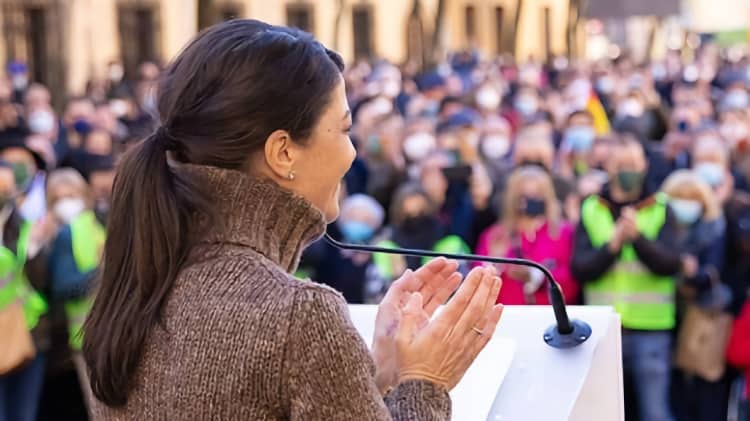Ángel Collado
The regional elections on 13 February in Castilla y León, a traditional fiefdom of the right, are an uncomfortable stop in the legislature for Pedro Sánchez, with a certain defeat, the effects of which he is already trying to mitigate by dividing his adversary.
The elections provide Pablo Casado with a new opportunity to establish himself as president of the PP and head of the opposition, after the opportunity lost with Isabel Díaz Ayuso’s victory in Madrid, when the success of the PP resulted in an internal fight over jealousy that has yet to be fully resolved.
Sánchez starts from a very unfavourable position. In addition to the accumulated wear and tear of forming a government and agreeing with the extreme left of Podemos, separatist groups and the political heirs of ETA, the head of the Executive comes to these regional elections with the bar set very high, as less than three years ago the PSOE came close to winning the Castilla y León regional government. It was the most voted party, with a percentage of 34.8 % and 35 representatives, leaving the PP in second place for the first time in 30 years.
The emergence of Ciudadanos in the 2019 elections, with 15 per cent of the votes and 13 procurators, split the right and the traditional PP electorate, but Pablo Casado’s team won by a landslide over the Socialists in the subsequent pacts. The sum of the Popular Party and Cs (the party then led by Albert Rivera) gave the Presidency of the Junta to the PP candidate, Alfonso Fernández Mañueco, on the basis of a coalition government.
The numbers, the 35 seats of the PSOE plus the 13 of Ciudadanos, were enough for an executive of socialists and riverists, but Ciudadanos then opted for the continuity of the PP in power. Castilla y León, like Madrid and Murcia, subsequently entered into Sánchez’s manoeuvres to regain regional power and give the coup de grâce to the PP via motions of censure by the hand of Cs once Rivera withdrew and was replaced by Inés Arrimadas.
Mañueco never quite trusted his partners and, given the decline of Ciudadanos, he responded by surprise to Isabel Díaz Ayuso’s operation by calling early elections.
All the polls, except the CIS governmental poll, now assume a clear victory for the PP by recovering the bulk of the vote lost to Ciudadanos, and place Mañueco more or less close to an absolute majority depending on the variable of the rise of Vox. In any case, the PSOE’s collapse is taken for granted.
Pedro Sánchez is trying to distance his image from the expected defeat and is limiting his presence in the electoral campaign in the region, the largest in Spain, to the essential: opening, closing and the weekend in between. Its Podemos allies, with barely 5 per cent of the votes in 2019, are out of the game in the Autonomous Community and only aspire to obtain one or two procurators.
The main front in the elections is on the right. Pablo Casado takes it as a personal challenge and participates in the campaign every day, more in parallel than together with Mañueco. The PP aspires to get close to an absolute majority of 41 seats, enough to avoid depending on Vox when it comes to the investiture of the president of the Junta or to form a government. Its aim is to repeat the result in the Madrid region, where if the extreme right wants to make its votes against Díaz Ayuso count, it is obliged to join the initiatives of the left.
The aspiration of the party led by Santiago Abascal is to avoid another fiasco, like the one experienced in Madrid last year, to condition a future government in Castilla y León and to demand its entry into the new regional executive. Vox only obtained one representative in the previous elections. In a region that always shies away from extremes, the polls predict a significant rise for Abascal’s party, which, if in the end it resembles that of Ciudadanos in 2019, would complicate Casado’s future.
A PP dependent on the support of the extreme right is the key figure in Sánchez’s argument to remain in power, even though he is in government with communists and backed by all the separatist groups. He already used it in Madrid, just like Pablo Iglesias and without any success, to stop Isabel Díaz Ayuso. He asked for the vote to stop the extreme right from the left, and he paid for the support of the PP candidate.
A Casado dependent on Abascal would serve Sánchez to conceal the foreseeable rejection of his administration in Castilla y León and, above all, a reversal of arguments for the next electoral stop of the legislature: the elections in Andalusia scheduled for the next quarter.







